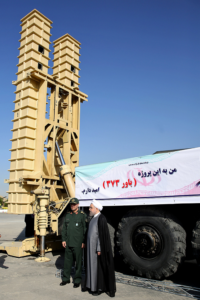
The Iran Project:
Iran has recently showcased its newest air defense missile system, Bavar-373, which features characteristics similar to Russia’s S-300, immediately prompting speculations that it is an answer to and a substitute to Russia’s systems, which have yet to be delivered to Tehran under an existing contract.
On Sunday Iranian President Hassan Rouhani unveiled the country’s long-awaited, domestically-built Bavar-373 surface-to-air missile (SAM) defense system.
The home-grown system, which was successfully test-fired in August 2014, is similar to the Russian S-300 and is capable of hitting high altitude targets.
On Monday, the country’s Defense Minister Hossein Dehghan announced that Tehran is set to begin the mass production of its Bavar-373 air defense system once the practical tests that are expected to continue until March 2017 have been completed.
All the above has sparked speculations that the system is an answer to and a substitute to Russia’s systems, which have yet to be delivered to Tehran under an existing contract.
Mahmud Shoori, Director of Eurasia Research Group at the Center for Strategic Research (CSR), a leading Iranian think tank, has commented to Sputnik on the issue.
Technologically, he said, it is quite hard to distinguish what the two systems, Russia’s S-300 and its Iranian analogue, the Bavar-373, have in common or how they differ from each other, and if they could be used simultaneously for similar purposes or not.
However what is more important here is that the domestic development of such a system underscores that the policy of Iran’s military defense industry is aimed at satisfying all of its military needs independently and on its own, to the extent it is possible. He said Tehran is particularly interested in independently ensuring the Islamic Republic’s strategic goals, one of which is the defense of its borders.
Throughout its existence, the expert stressed, Iran has never relied on the support of other states but only on its own capabilities.
